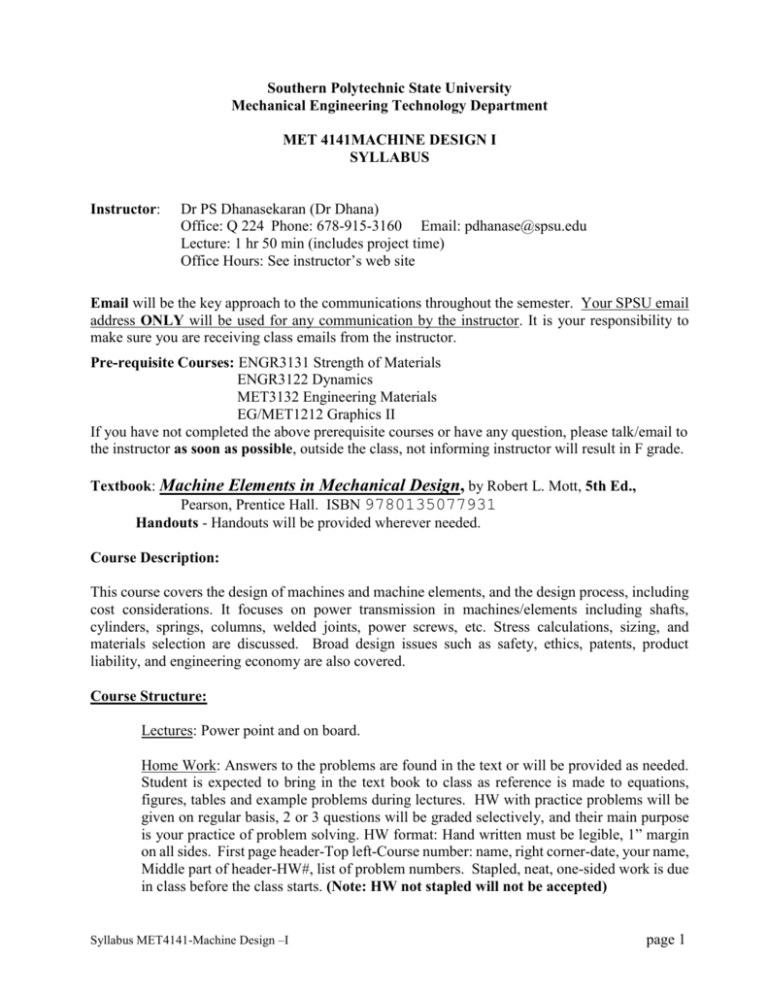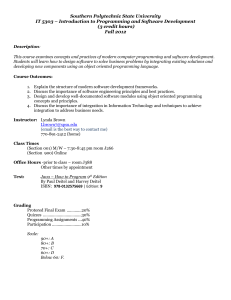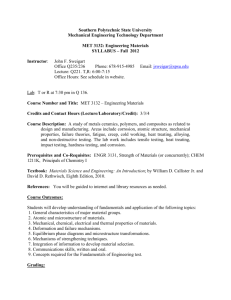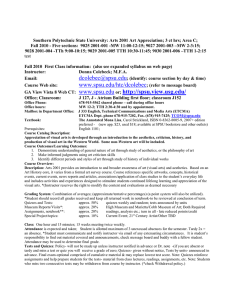
Southern Polytechnic State University
Mechanical Engineering Technology Department
MET 4141MACHINE DESIGN I
SYLLABUS
Instructor:
Dr PS Dhanasekaran (Dr Dhana)
Office: Q 224 Phone: 678-915-3160 Email: pdhanase@spsu.edu
Lecture: 1 hr 50 min (includes project time)
Office Hours: See instructor’s web site
Email will be the key approach to the communications throughout the semester. Your SPSU email
address ONLY will be used for any communication by the instructor. It is your responsibility to
make sure you are receiving class emails from the instructor.
Pre-requisite Courses: ENGR3131 Strength of Materials
ENGR3122 Dynamics
MET3132 Engineering Materials
EG/MET1212 Graphics II
If you have not completed the above prerequisite courses or have any question, please talk/email to
the instructor as soon as possible, outside the class, not informing instructor will result in F grade.
Textbook: Machine Elements in Mechanical Design, by Robert L. Mott, 5th Ed.,
Pearson, Prentice Hall. ISBN 9780135077931
Handouts - Handouts will be provided wherever needed.
Course Description:
This course covers the design of machines and machine elements, and the design process, including
cost considerations. It focuses on power transmission in machines/elements including shafts,
cylinders, springs, columns, welded joints, power screws, etc. Stress calculations, sizing, and
materials selection are discussed. Broad design issues such as safety, ethics, patents, product
liability, and engineering economy are also covered.
Course Structure:
Lectures: Power point and on board.
Home Work: Answers to the problems are found in the text or will be provided as needed.
Student is expected to bring in the text book to class as reference is made to equations,
figures, tables and example problems during lectures. HW with practice problems will be
given on regular basis, 2 or 3 questions will be graded selectively, and their main purpose
is your practice of problem solving. HW format: Hand written must be legible, 1” margin
on all sides. First page header-Top left-Course number: name, right corner-date, your name,
Middle part of header-HW#, list of problem numbers. Stapled, neat, one-sided work is due
in class before the class starts. (Note: HW not stapled will not be accepted)
Syllabus MET4141-Machine Design –I
page 1
1) All units must be written correctly, wrong units or not writing of units will
attract minus points.
2) You have to write all equations used, and plug in values with unit conversions
wherever needed and show step by step calculations, writing only answers will not
be graded.
Design Project: It constitutes 25% of your course grade. Groups of 3-4 students propose, develop,
and solve unique design problems in a systematic manner as guided by the instructor. A midterm
and a final oral presentation along with a working prototype, a poster and a final report are required.
Many more detailed instructions will be provided as the project progresses.
Design project, which may involve conceptualization, market study, mathematical and
graphical modeling, analyses, and prototype construction and testing. The project team
formation and project topic proposals start 1stweek of classes. Students are strongly encouraged to
start forming their tentative groups immediately and start thinking about possible 3-4 topics. The
group should also try to find a total of 3-6 hours per week of common project time, even in small
blocks. Example design topics will be discussed in class. A formal final report, a poster, an
extended abstract (from the report) and oral presentation are the culmination of the design
project. For contents of the project report/guidelines separate sheet will be issued.
Course Outcomes (this is under revision to reflect reality):
Students completing this course will demonstrate competency in elementary machine design by:
calculating the two-dimensional deflection of beams using a series representation
modified for discontinuities;
determining limit loads, residual stresses, and permanent strains
effect of twisting and bending an elastic-perfectly plastic shaft;
applying theories of failure appropriate to yield and fatigue for
design envelopes like Goodman’s to predict cycles to failure;
becoming familiar with the concept, design, and analysis of the more common machine
elements;
combining common machine elements to form a power train;
selecting and specifying commercially available materials and machine elements;
including economic and ethical considerations in their designs;
preparing oral presentations and written reports documenting the conception,
production, and evaluation of their designs.
Grading:
The course grade will be based upon 4 quizzes, tests, Finals, home works, and project (active
participation, successful prototype, presentation, poster and report). Not all home works will be
collected or graded. Their main purpose is your practice of problem solving. The components of the
final grade will be weighed approximately as follows:
Syllabus MET4141-Machine Design –I
page 2
Item
Project- active participation, (proposal +
Mid.Term), (Final present., poster +
Report+ Fabrication or proto type)
Quizzes
HW
Tests
Take home test
Finals
Total
Percentage
25%
15%
10%
15%
15%
20%
100%
Assessment:
The student will receive a letter grade based on the following scheme.
Overall %
> 88
79 – 88
70 - 79
60 – 70
< 60
Grade
A
B
C
D
F
In order to receive a passing grade in the course it is necessary to attain a
passing grade (60%) or higher on BOTH lecture and project portions of
the course.
Note: Those who are retaking the course for various reasons, must participate
in course and project and to pass both individually.
Attendance Policy:
Students are expected to be in every class and on time. Students are responsible for material covered
in class as well as all assignments even if they are absent. Excessive tardiness and unexcused
absences (more than 5 classes) may result in a lower grade or even course failure if the instructor
feels such lack of participation is detrimental to the student's progress in the course. Late (more than
5 minutes) attendance in two classes is considered as one absence.
Note: Daily class attendance will be taken and extra final bonus points will be given as mention
below.
> 95 % 2 points
> 90 % 1 point
< 90 % "0" point
Makeup Policy:
Assignments are due at the BEGINNING of class on the due date. Late assignments may only be
accepted with a penalty of 50%. Once solutions are provided/posted, no assignments will be
Syllabus MET4141-Machine Design –I
page 3
accepted. Of course in unusual situations, as determined by the instructor, late assignments may be
accepted. Exams/quizzes may only be made up if arranged before the scheduled period, and ONLY
in the case of an excused absence as defined by the university policy.
Academic Integrity:
Honor system is followed in this course and the instructor trusts the students in applying strict ethics
in their academic activities. Thus any act of academic dishonesty such as fraud and deception,
including plagiarism, will not be tolerated at all and will be punished by academic and/or disciplinary
sanctions. Any material not authored by the student but used in any submitted/presented work must
be properly acknowledged. Cheating, including any evidence of the use of other students’ works,
will result in severe penalties including zero for the assignment, failure in the course, and expulsion,
consistent with university policy.
SPSU has an Honor Code and a new procedure relating to when academic misconduct is alleged.
All students should be aware of them. Information about the Honor Code and the misconduct
procedure may be found at http://spsu.edu/honorcode/.
Follow this link for further guidance on Academic
Dishonesty: http://lovelace.spsu.edu/bharbort/conduct.html
Students with disabilities:
Students with disabilities who believe that they may need accommodations in this class are
encouraged to contact the coordinator of disabilities services at 678-915-7244 as soon as possible to
better ensure that such accommodations are implemented in a timely fashion. Please visit the
disabilities services web page at SPSU for more information.
http://www.spsu.edu/attic/Dis_Svcs.html
General:
Use of formula sheets may be provided on some exams. The requirements for each exam will be
announced well in advance. Scientific and/or graphic calculators are allowed, but no portable
computers (any device with a QWERTY keyboard will be regarded as a computer) may be used. No
communication and/or entertainment devices such as cell phones, PDA, MP3/4 players, ear buds,
blue tooth devices, headphones will be allowed as calculators or otherwise in any test or quiz.
CONSULTATION/CLASS PARTICIPATION: You are strongly encouraged to take part in
class discussion.
Apart from office hours students are free to meet me in my office if you want to discuss privately
with prior appointment. For most questions concerning HW problems, clarification of topics in book
or those discussed in class, e-mail is the preferred mode of communication. Students will get
response very promptly.
Group Study:
Students are strongly encouraged to study in groups. This prompts responsible study habits and
makes it more pleasurable to study and learn especially new knowledge. Group study is also shown
Syllabus MET4141-Machine Design –I
page 4
to enhance thinking process and thus it becomes easy and efficient to complete assignments. Your
study group could be your project group.
Other useful links/sources (recommended to use/refer for this course):
1) Mat web - source for materials information (www.matweb.com)
2) Design Data Handbooks
3) Standards such as American standards for various products (ex:- AGMA for gears)
4) ISO standards for various mechanical design
5) DIN standards for various mechanical design
6) JIS standards for various mechanical design
7) BS standards for various mechanical design
8) Rail industry, Aircraft and Automotive industries follow their own standards for their use.
Syllabus MET4141-Machine Design –I
page 5











